Understanding Customer Behavior: Trends in Tourism Business
VerifiedAdded on 2023/06/12
|9
|2174
|251
Report
AI Summary
This report provides a comprehensive analysis of customer behavior within the tourism industry. It examines contemporary perspectives on consumption, including economic, symbolic, and cultural viewpoints, and delves into the complexities of consumer decision-making processes, highlighting the importance of intelligence, design, and choice activities. The report also emphasizes the significance of understanding individual consumer behavior through psychological, social, and personal factors. Furthermore, it categorizes consumers into types such as choosers, explorers, rebels, communicators, and identity seekers, and discusses emerging trends like booking apps, affordable transportation, online demos, and keyless/cashless accommodation services, ultimately stressing the importance of these insights for organizational growth and development in the tourism sector. Desklib offers a wide range of similar solved assignments and resources for students.
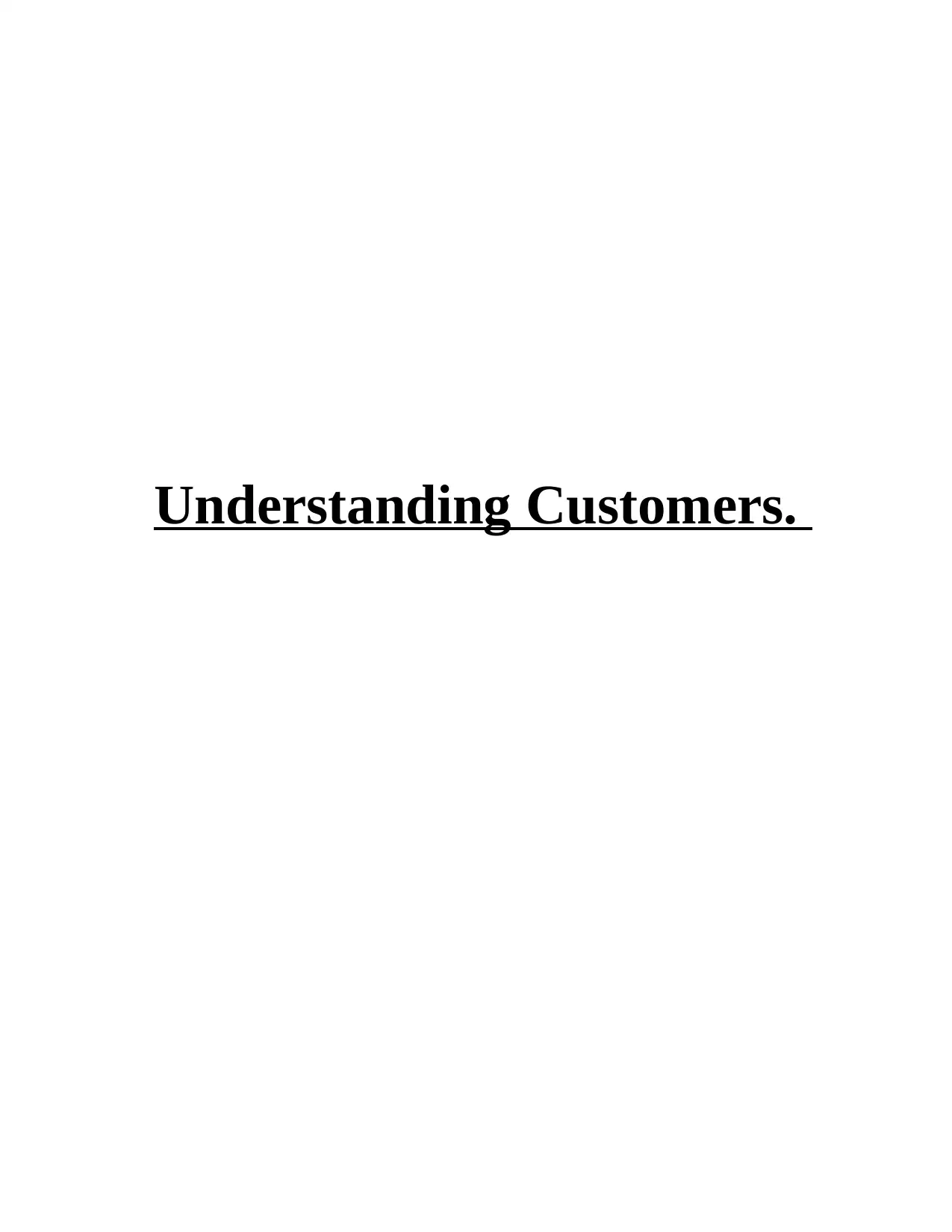
Understanding Customers.
Paraphrase This Document
Need a fresh take? Get an instant paraphrase of this document with our AI Paraphraser
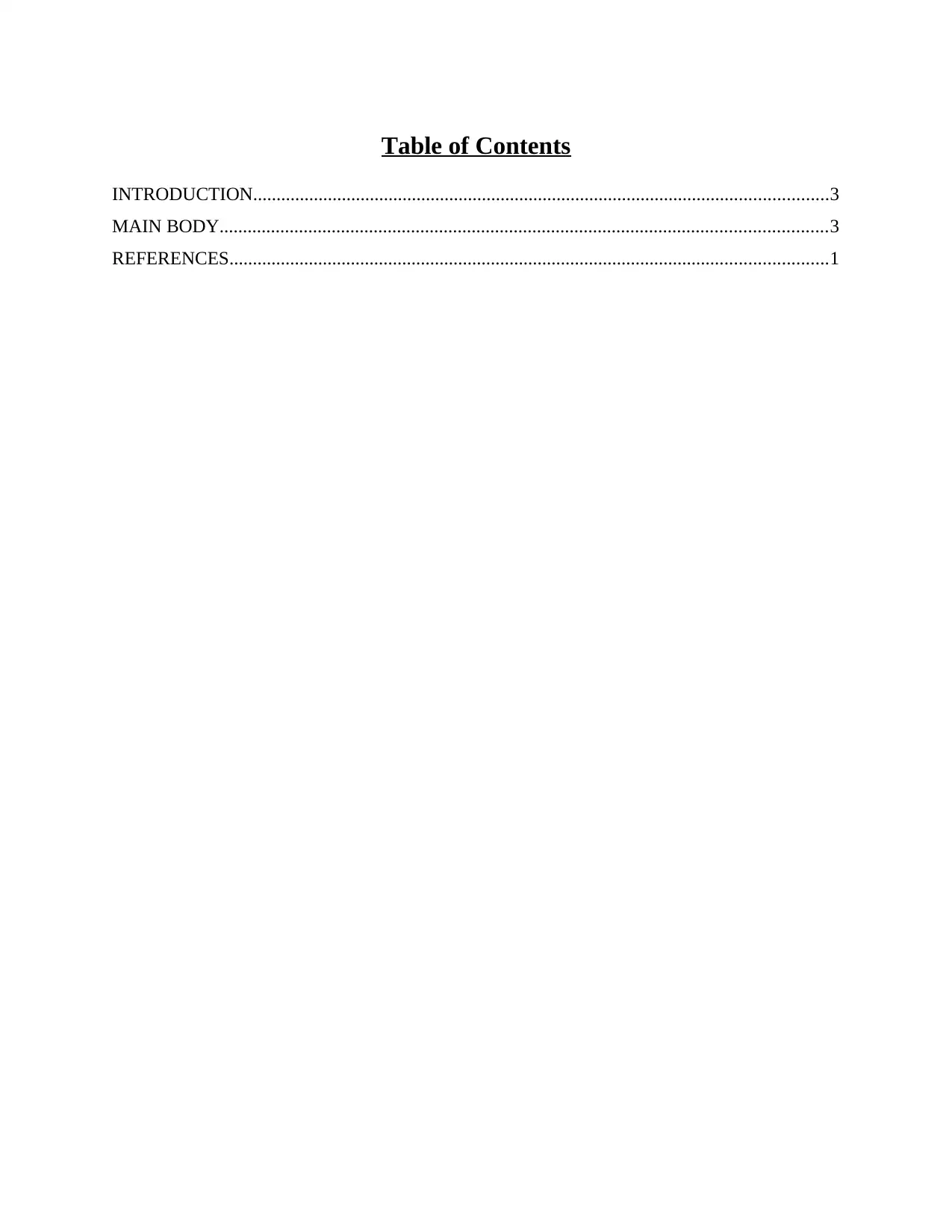
Table of Contents
INTRODUCTION...........................................................................................................................3
MAIN BODY..................................................................................................................................3
REFERENCES................................................................................................................................1
INTRODUCTION...........................................................................................................................3
MAIN BODY..................................................................................................................................3
REFERENCES................................................................................................................................1
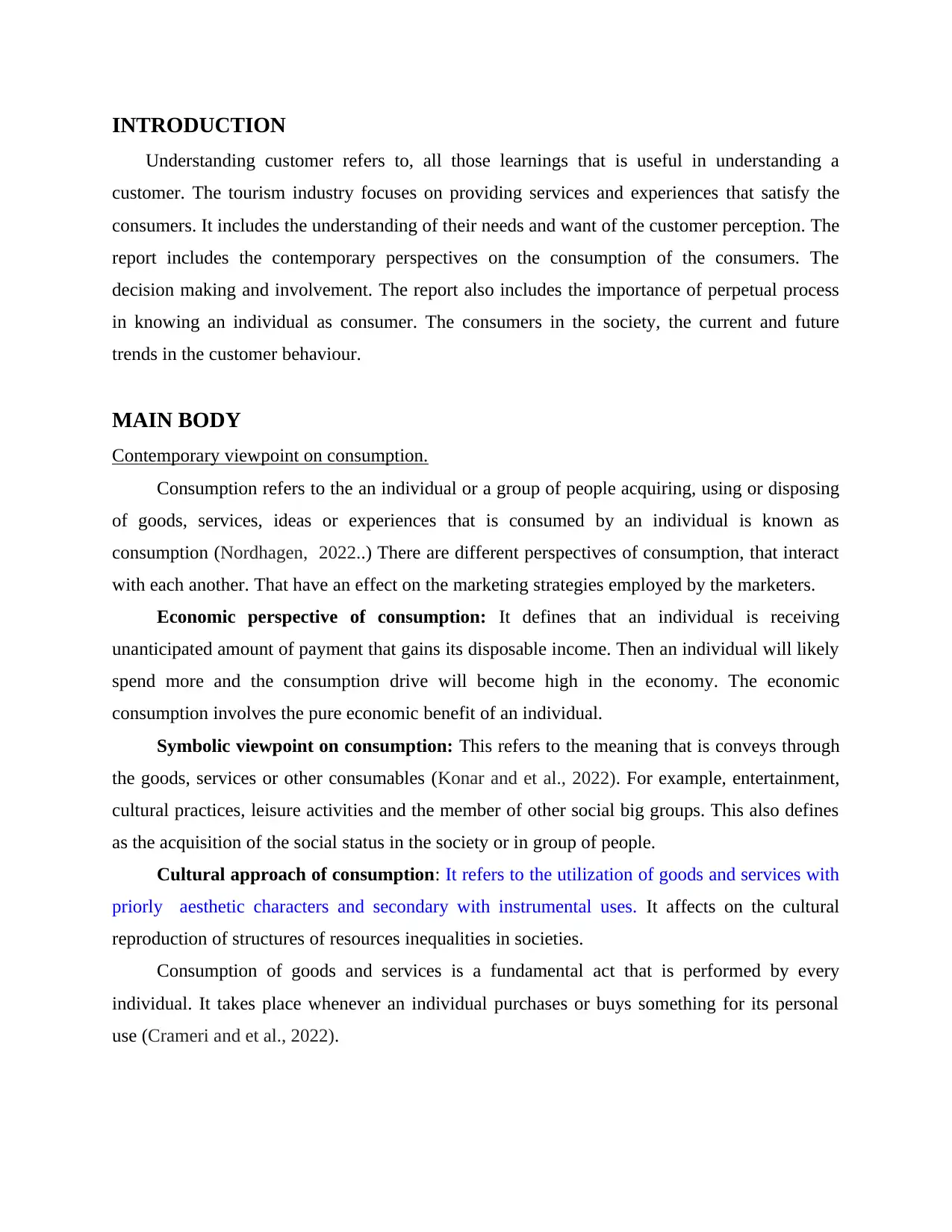
INTRODUCTION
Understanding customer refers to, all those learnings that is useful in understanding a
customer. The tourism industry focuses on providing services and experiences that satisfy the
consumers. It includes the understanding of their needs and want of the customer perception. The
report includes the contemporary perspectives on the consumption of the consumers. The
decision making and involvement. The report also includes the importance of perpetual process
in knowing an individual as consumer. The consumers in the society, the current and future
trends in the customer behaviour.
MAIN BODY
Contemporary viewpoint on consumption.
Consumption refers to the an individual or a group of people acquiring, using or disposing
of goods, services, ideas or experiences that is consumed by an individual is known as
consumption (Nordhagen, 2022..) There are different perspectives of consumption, that interact
with each another. That have an effect on the marketing strategies employed by the marketers.
Economic perspective of consumption: It defines that an individual is receiving
unanticipated amount of payment that gains its disposable income. Then an individual will likely
spend more and the consumption drive will become high in the economy. The economic
consumption involves the pure economic benefit of an individual.
Symbolic viewpoint on consumption: This refers to the meaning that is conveys through
the goods, services or other consumables (Konar and et al., 2022). For example, entertainment,
cultural practices, leisure activities and the member of other social big groups. This also defines
as the acquisition of the social status in the society or in group of people.
Cultural approach of consumption: It refers to the utilization of goods and services with
priorly aesthetic characters and secondary with instrumental uses. It affects on the cultural
reproduction of structures of resources inequalities in societies.
Consumption of goods and services is a fundamental act that is performed by every
individual. It takes place whenever an individual purchases or buys something for its personal
use (Crameri and et al., 2022).
Understanding customer refers to, all those learnings that is useful in understanding a
customer. The tourism industry focuses on providing services and experiences that satisfy the
consumers. It includes the understanding of their needs and want of the customer perception. The
report includes the contemporary perspectives on the consumption of the consumers. The
decision making and involvement. The report also includes the importance of perpetual process
in knowing an individual as consumer. The consumers in the society, the current and future
trends in the customer behaviour.
MAIN BODY
Contemporary viewpoint on consumption.
Consumption refers to the an individual or a group of people acquiring, using or disposing
of goods, services, ideas or experiences that is consumed by an individual is known as
consumption (Nordhagen, 2022..) There are different perspectives of consumption, that interact
with each another. That have an effect on the marketing strategies employed by the marketers.
Economic perspective of consumption: It defines that an individual is receiving
unanticipated amount of payment that gains its disposable income. Then an individual will likely
spend more and the consumption drive will become high in the economy. The economic
consumption involves the pure economic benefit of an individual.
Symbolic viewpoint on consumption: This refers to the meaning that is conveys through
the goods, services or other consumables (Konar and et al., 2022). For example, entertainment,
cultural practices, leisure activities and the member of other social big groups. This also defines
as the acquisition of the social status in the society or in group of people.
Cultural approach of consumption: It refers to the utilization of goods and services with
priorly aesthetic characters and secondary with instrumental uses. It affects on the cultural
reproduction of structures of resources inequalities in societies.
Consumption of goods and services is a fundamental act that is performed by every
individual. It takes place whenever an individual purchases or buys something for its personal
use (Crameri and et al., 2022).
⊘ This is a preview!⊘
Do you want full access?
Subscribe today to unlock all pages.

Trusted by 1+ million students worldwide
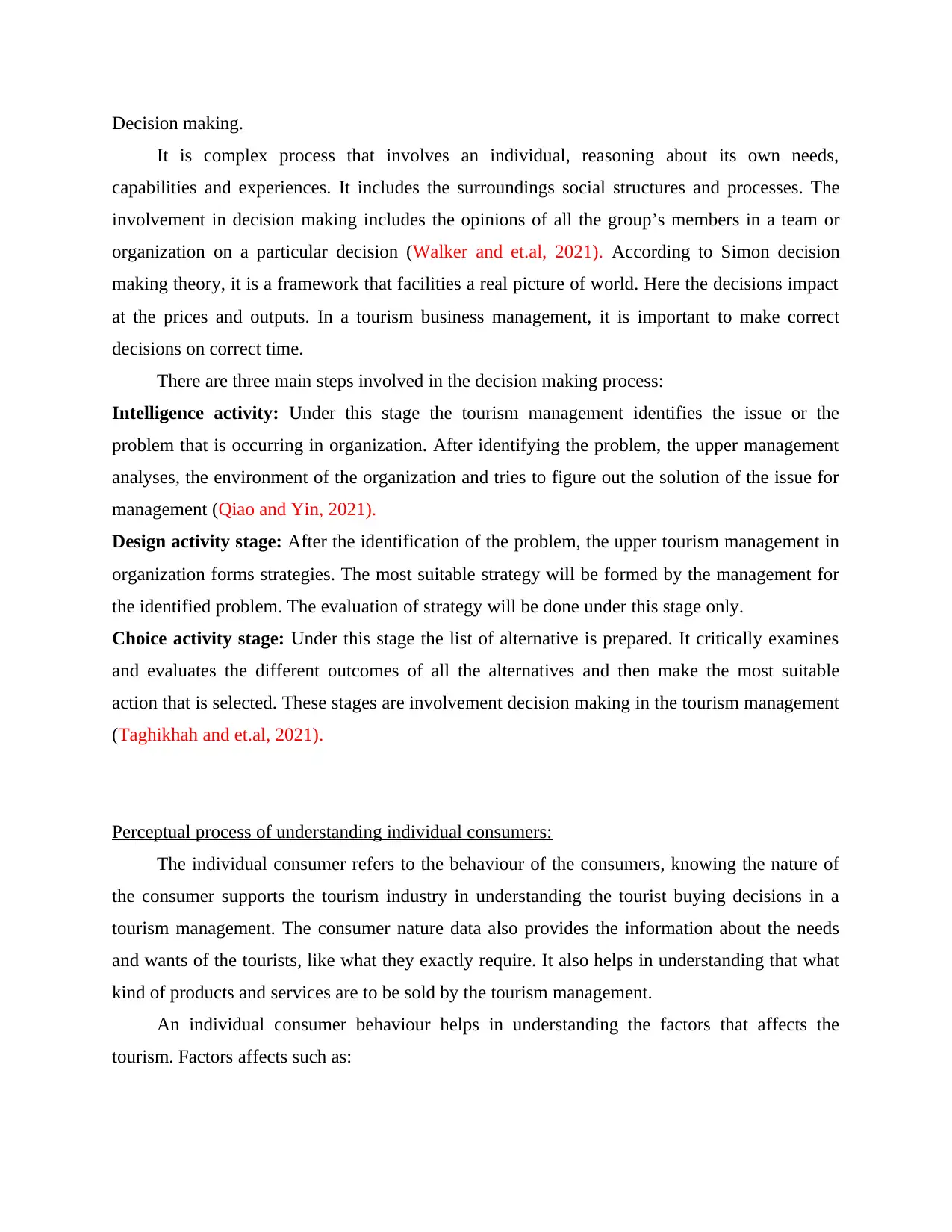
Decision making.
It is complex process that involves an individual, reasoning about its own needs,
capabilities and experiences. It includes the surroundings social structures and processes. The
involvement in decision making includes the opinions of all the group’s members in a team or
organization on a particular decision (Walker and et.al, 2021). According to Simon decision
making theory, it is a framework that facilities a real picture of world. Here the decisions impact
at the prices and outputs. In a tourism business management, it is important to make correct
decisions on correct time.
There are three main steps involved in the decision making process:
Intelligence activity: Under this stage the tourism management identifies the issue or the
problem that is occurring in organization. After identifying the problem, the upper management
analyses, the environment of the organization and tries to figure out the solution of the issue for
management (Qiao and Yin, 2021).
Design activity stage: After the identification of the problem, the upper tourism management in
organization forms strategies. The most suitable strategy will be formed by the management for
the identified problem. The evaluation of strategy will be done under this stage only.
Choice activity stage: Under this stage the list of alternative is prepared. It critically examines
and evaluates the different outcomes of all the alternatives and then make the most suitable
action that is selected. These stages are involvement decision making in the tourism management
(Taghikhah and et.al, 2021).
Perceptual process of understanding individual consumers:
The individual consumer refers to the behaviour of the consumers, knowing the nature of
the consumer supports the tourism industry in understanding the tourist buying decisions in a
tourism management. The consumer nature data also provides the information about the needs
and wants of the tourists, like what they exactly require. It also helps in understanding that what
kind of products and services are to be sold by the tourism management.
An individual consumer behaviour helps in understanding the factors that affects the
tourism. Factors affects such as:
It is complex process that involves an individual, reasoning about its own needs,
capabilities and experiences. It includes the surroundings social structures and processes. The
involvement in decision making includes the opinions of all the group’s members in a team or
organization on a particular decision (Walker and et.al, 2021). According to Simon decision
making theory, it is a framework that facilities a real picture of world. Here the decisions impact
at the prices and outputs. In a tourism business management, it is important to make correct
decisions on correct time.
There are three main steps involved in the decision making process:
Intelligence activity: Under this stage the tourism management identifies the issue or the
problem that is occurring in organization. After identifying the problem, the upper management
analyses, the environment of the organization and tries to figure out the solution of the issue for
management (Qiao and Yin, 2021).
Design activity stage: After the identification of the problem, the upper tourism management in
organization forms strategies. The most suitable strategy will be formed by the management for
the identified problem. The evaluation of strategy will be done under this stage only.
Choice activity stage: Under this stage the list of alternative is prepared. It critically examines
and evaluates the different outcomes of all the alternatives and then make the most suitable
action that is selected. These stages are involvement decision making in the tourism management
(Taghikhah and et.al, 2021).
Perceptual process of understanding individual consumers:
The individual consumer refers to the behaviour of the consumers, knowing the nature of
the consumer supports the tourism industry in understanding the tourist buying decisions in a
tourism management. The consumer nature data also provides the information about the needs
and wants of the tourists, like what they exactly require. It also helps in understanding that what
kind of products and services are to be sold by the tourism management.
An individual consumer behaviour helps in understanding the factors that affects the
tourism. Factors affects such as:
Paraphrase This Document
Need a fresh take? Get an instant paraphrase of this document with our AI Paraphraser
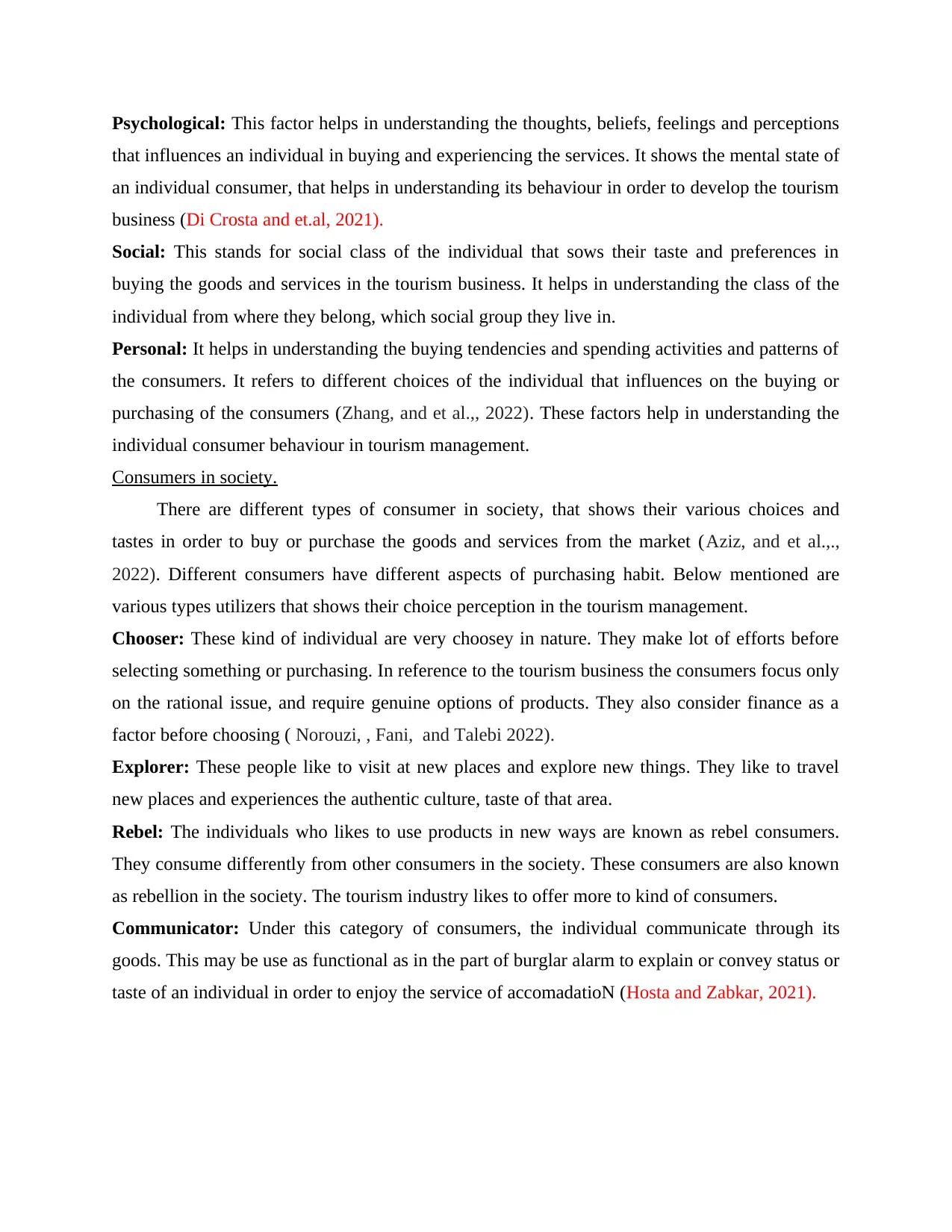
Psychological: This factor helps in understanding the thoughts, beliefs, feelings and perceptions
that influences an individual in buying and experiencing the services. It shows the mental state of
an individual consumer, that helps in understanding its behaviour in order to develop the tourism
business (Di Crosta and et.al, 2021).
Social: This stands for social class of the individual that sows their taste and preferences in
buying the goods and services in the tourism business. It helps in understanding the class of the
individual from where they belong, which social group they live in.
Personal: It helps in understanding the buying tendencies and spending activities and patterns of
the consumers. It refers to different choices of the individual that influences on the buying or
purchasing of the consumers (Zhang, and et al.,, 2022). These factors help in understanding the
individual consumer behaviour in tourism management.
Consumers in society.
There are different types of consumer in society, that shows their various choices and
tastes in order to buy or purchase the goods and services from the market (Aziz, and et al.,.,
2022). Different consumers have different aspects of purchasing habit. Below mentioned are
various types utilizers that shows their choice perception in the tourism management.
Chooser: These kind of individual are very choosey in nature. They make lot of efforts before
selecting something or purchasing. In reference to the tourism business the consumers focus only
on the rational issue, and require genuine options of products. They also consider finance as a
factor before choosing ( Norouzi, , Fani, and Talebi 2022).
Explorer: These people like to visit at new places and explore new things. They like to travel
new places and experiences the authentic culture, taste of that area.
Rebel: The individuals who likes to use products in new ways are known as rebel consumers.
They consume differently from other consumers in the society. These consumers are also known
as rebellion in the society. The tourism industry likes to offer more to kind of consumers.
Communicator: Under this category of consumers, the individual communicate through its
goods. This may be use as functional as in the part of burglar alarm to explain or convey status or
taste of an individual in order to enjoy the service of accomadatioN (Hosta and Zabkar, 2021).
that influences an individual in buying and experiencing the services. It shows the mental state of
an individual consumer, that helps in understanding its behaviour in order to develop the tourism
business (Di Crosta and et.al, 2021).
Social: This stands for social class of the individual that sows their taste and preferences in
buying the goods and services in the tourism business. It helps in understanding the class of the
individual from where they belong, which social group they live in.
Personal: It helps in understanding the buying tendencies and spending activities and patterns of
the consumers. It refers to different choices of the individual that influences on the buying or
purchasing of the consumers (Zhang, and et al.,, 2022). These factors help in understanding the
individual consumer behaviour in tourism management.
Consumers in society.
There are different types of consumer in society, that shows their various choices and
tastes in order to buy or purchase the goods and services from the market (Aziz, and et al.,.,
2022). Different consumers have different aspects of purchasing habit. Below mentioned are
various types utilizers that shows their choice perception in the tourism management.
Chooser: These kind of individual are very choosey in nature. They make lot of efforts before
selecting something or purchasing. In reference to the tourism business the consumers focus only
on the rational issue, and require genuine options of products. They also consider finance as a
factor before choosing ( Norouzi, , Fani, and Talebi 2022).
Explorer: These people like to visit at new places and explore new things. They like to travel
new places and experiences the authentic culture, taste of that area.
Rebel: The individuals who likes to use products in new ways are known as rebel consumers.
They consume differently from other consumers in the society. These consumers are also known
as rebellion in the society. The tourism industry likes to offer more to kind of consumers.
Communicator: Under this category of consumers, the individual communicate through its
goods. This may be use as functional as in the part of burglar alarm to explain or convey status or
taste of an individual in order to enjoy the service of accomadatioN (Hosta and Zabkar, 2021).
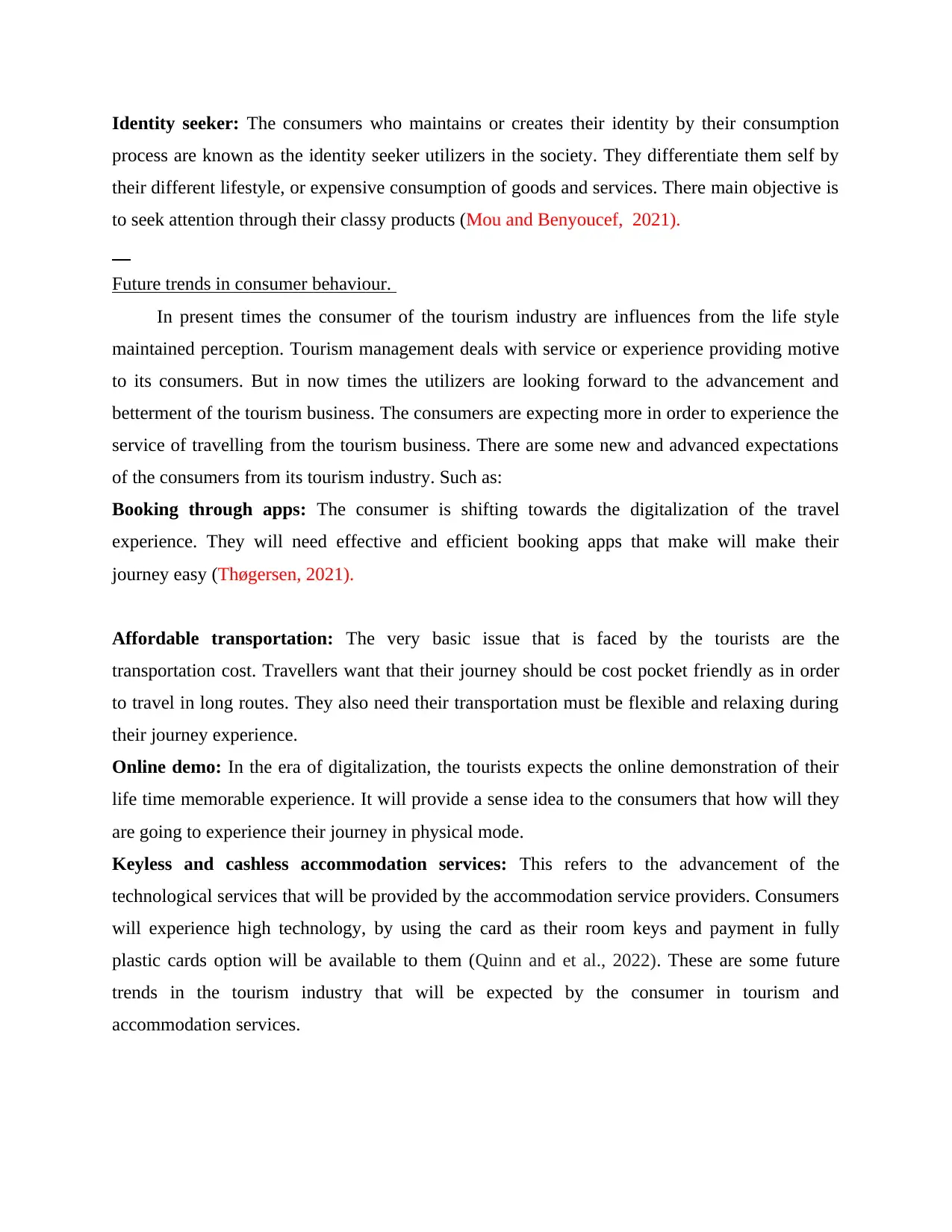
Identity seeker: The consumers who maintains or creates their identity by their consumption
process are known as the identity seeker utilizers in the society. They differentiate them self by
their different lifestyle, or expensive consumption of goods and services. There main objective is
to seek attention through their classy products (Mou and Benyoucef, 2021).
Future trends in consumer behaviour.
In present times the consumer of the tourism industry are influences from the life style
maintained perception. Tourism management deals with service or experience providing motive
to its consumers. But in now times the utilizers are looking forward to the advancement and
betterment of the tourism business. The consumers are expecting more in order to experience the
service of travelling from the tourism business. There are some new and advanced expectations
of the consumers from its tourism industry. Such as:
Booking through apps: The consumer is shifting towards the digitalization of the travel
experience. They will need effective and efficient booking apps that make will make their
journey easy (Thøgersen, 2021).
Affordable transportation: The very basic issue that is faced by the tourists are the
transportation cost. Travellers want that their journey should be cost pocket friendly as in order
to travel in long routes. They also need their transportation must be flexible and relaxing during
their journey experience.
Online demo: In the era of digitalization, the tourists expects the online demonstration of their
life time memorable experience. It will provide a sense idea to the consumers that how will they
are going to experience their journey in physical mode.
Keyless and cashless accommodation services: This refers to the advancement of the
technological services that will be provided by the accommodation service providers. Consumers
will experience high technology, by using the card as their room keys and payment in fully
plastic cards option will be available to them (Quinn and et al., 2022). These are some future
trends in the tourism industry that will be expected by the consumer in tourism and
accommodation services.
process are known as the identity seeker utilizers in the society. They differentiate them self by
their different lifestyle, or expensive consumption of goods and services. There main objective is
to seek attention through their classy products (Mou and Benyoucef, 2021).
Future trends in consumer behaviour.
In present times the consumer of the tourism industry are influences from the life style
maintained perception. Tourism management deals with service or experience providing motive
to its consumers. But in now times the utilizers are looking forward to the advancement and
betterment of the tourism business. The consumers are expecting more in order to experience the
service of travelling from the tourism business. There are some new and advanced expectations
of the consumers from its tourism industry. Such as:
Booking through apps: The consumer is shifting towards the digitalization of the travel
experience. They will need effective and efficient booking apps that make will make their
journey easy (Thøgersen, 2021).
Affordable transportation: The very basic issue that is faced by the tourists are the
transportation cost. Travellers want that their journey should be cost pocket friendly as in order
to travel in long routes. They also need their transportation must be flexible and relaxing during
their journey experience.
Online demo: In the era of digitalization, the tourists expects the online demonstration of their
life time memorable experience. It will provide a sense idea to the consumers that how will they
are going to experience their journey in physical mode.
Keyless and cashless accommodation services: This refers to the advancement of the
technological services that will be provided by the accommodation service providers. Consumers
will experience high technology, by using the card as their room keys and payment in fully
plastic cards option will be available to them (Quinn and et al., 2022). These are some future
trends in the tourism industry that will be expected by the consumer in tourism and
accommodation services.
⊘ This is a preview!⊘
Do you want full access?
Subscribe today to unlock all pages.

Trusted by 1+ million students worldwide
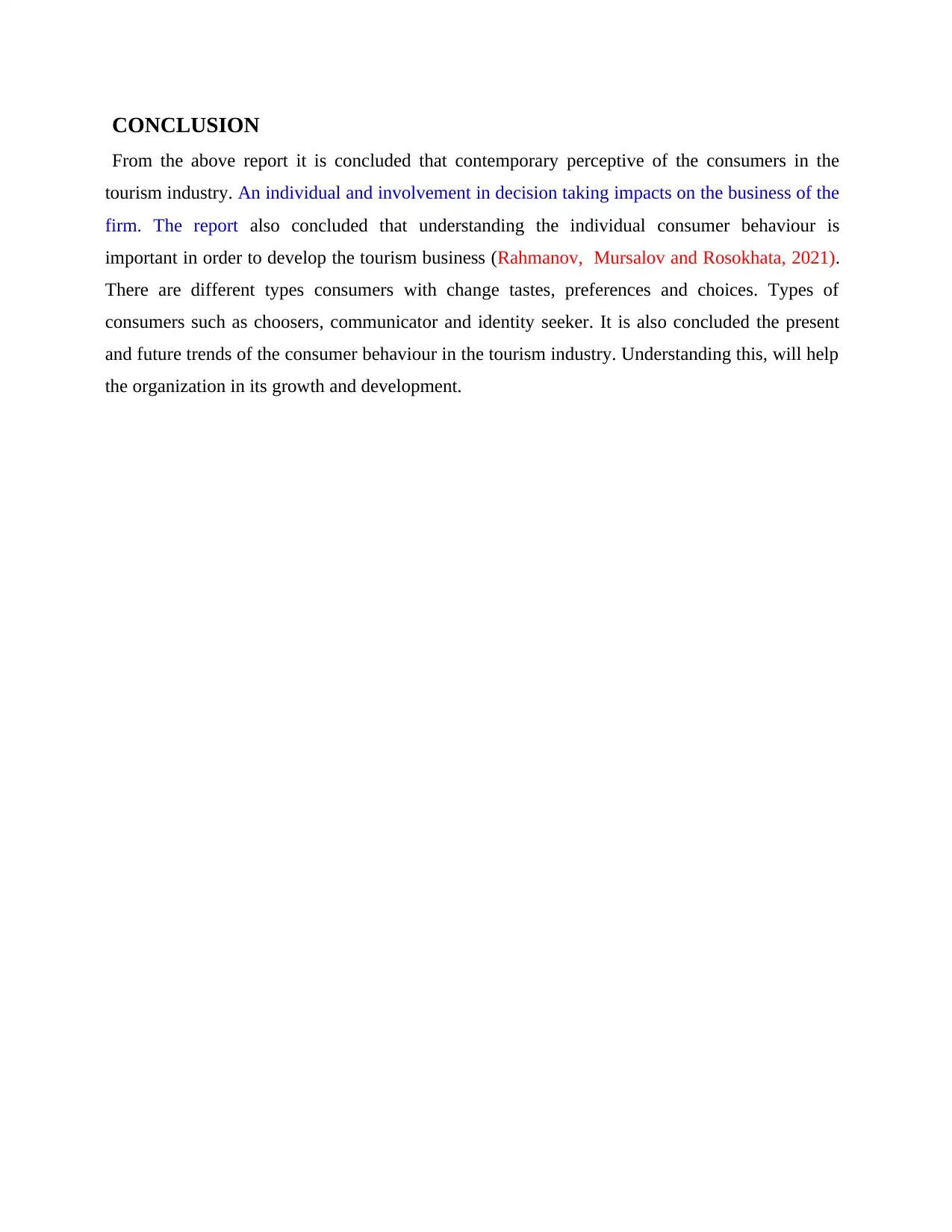
CONCLUSION
From the above report it is concluded that contemporary perceptive of the consumers in the
tourism industry. An individual and involvement in decision taking impacts on the business of the
firm. The report also concluded that understanding the individual consumer behaviour is
important in order to develop the tourism business (Rahmanov, Mursalov and Rosokhata, 2021).
There are different types consumers with change tastes, preferences and choices. Types of
consumers such as choosers, communicator and identity seeker. It is also concluded the present
and future trends of the consumer behaviour in the tourism industry. Understanding this, will help
the organization in its growth and development.
From the above report it is concluded that contemporary perceptive of the consumers in the
tourism industry. An individual and involvement in decision taking impacts on the business of the
firm. The report also concluded that understanding the individual consumer behaviour is
important in order to develop the tourism business (Rahmanov, Mursalov and Rosokhata, 2021).
There are different types consumers with change tastes, preferences and choices. Types of
consumers such as choosers, communicator and identity seeker. It is also concluded the present
and future trends of the consumer behaviour in the tourism industry. Understanding this, will help
the organization in its growth and development.
Paraphrase This Document
Need a fresh take? Get an instant paraphrase of this document with our AI Paraphraser
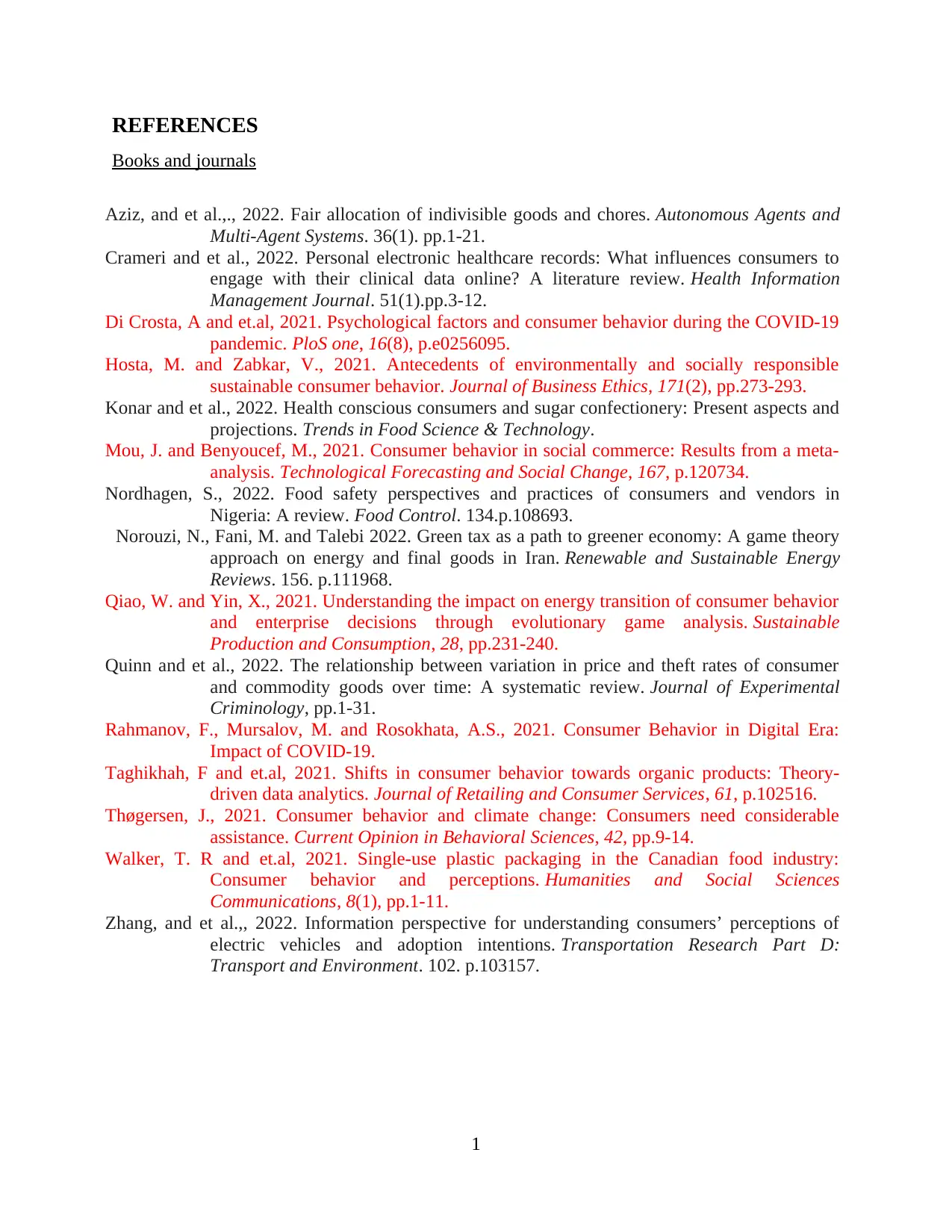
REFERENCES
Books and journals
Aziz, and et al.,., 2022. Fair allocation of indivisible goods and chores. Autonomous Agents and
Multi-Agent Systems. 36(1). pp.1-21.
Crameri and et al., 2022. Personal electronic healthcare records: What influences consumers to
engage with their clinical data online? A literature review. Health Information
Management Journal. 51(1).pp.3-12.
Di Crosta, A and et.al, 2021. Psychological factors and consumer behavior during the COVID-19
pandemic. PloS one, 16(8), p.e0256095.
Hosta, M. and Zabkar, V., 2021. Antecedents of environmentally and socially responsible
sustainable consumer behavior. Journal of Business Ethics, 171(2), pp.273-293.
Konar and et al., 2022. Health conscious consumers and sugar confectionery: Present aspects and
projections. Trends in Food Science & Technology.
Mou, J. and Benyoucef, M., 2021. Consumer behavior in social commerce: Results from a meta-
analysis. Technological Forecasting and Social Change, 167, p.120734.
Nordhagen, S., 2022. Food safety perspectives and practices of consumers and vendors in
Nigeria: A review. Food Control. 134.p.108693.
Norouzi, N., Fani, M. and Talebi 2022. Green tax as a path to greener economy: A game theory
approach on energy and final goods in Iran. Renewable and Sustainable Energy
Reviews. 156. p.111968.
Qiao, W. and Yin, X., 2021. Understanding the impact on energy transition of consumer behavior
and enterprise decisions through evolutionary game analysis. Sustainable
Production and Consumption, 28, pp.231-240.
Quinn and et al., 2022. The relationship between variation in price and theft rates of consumer
and commodity goods over time: A systematic review. Journal of Experimental
Criminology, pp.1-31.
Rahmanov, F., Mursalov, M. and Rosokhata, A.S., 2021. Consumer Behavior in Digital Era:
Impact of COVID-19.
Taghikhah, F and et.al, 2021. Shifts in consumer behavior towards organic products: Theory-
driven data analytics. Journal of Retailing and Consumer Services, 61, p.102516.
Thøgersen, J., 2021. Consumer behavior and climate change: Consumers need considerable
assistance. Current Opinion in Behavioral Sciences, 42, pp.9-14.
Walker, T. R and et.al, 2021. Single-use plastic packaging in the Canadian food industry:
Consumer behavior and perceptions. Humanities and Social Sciences
Communications, 8(1), pp.1-11.
Zhang, and et al.,, 2022. Information perspective for understanding consumers’ perceptions of
electric vehicles and adoption intentions. Transportation Research Part D:
Transport and Environment. 102. p.103157.
1
Books and journals
Aziz, and et al.,., 2022. Fair allocation of indivisible goods and chores. Autonomous Agents and
Multi-Agent Systems. 36(1). pp.1-21.
Crameri and et al., 2022. Personal electronic healthcare records: What influences consumers to
engage with their clinical data online? A literature review. Health Information
Management Journal. 51(1).pp.3-12.
Di Crosta, A and et.al, 2021. Psychological factors and consumer behavior during the COVID-19
pandemic. PloS one, 16(8), p.e0256095.
Hosta, M. and Zabkar, V., 2021. Antecedents of environmentally and socially responsible
sustainable consumer behavior. Journal of Business Ethics, 171(2), pp.273-293.
Konar and et al., 2022. Health conscious consumers and sugar confectionery: Present aspects and
projections. Trends in Food Science & Technology.
Mou, J. and Benyoucef, M., 2021. Consumer behavior in social commerce: Results from a meta-
analysis. Technological Forecasting and Social Change, 167, p.120734.
Nordhagen, S., 2022. Food safety perspectives and practices of consumers and vendors in
Nigeria: A review. Food Control. 134.p.108693.
Norouzi, N., Fani, M. and Talebi 2022. Green tax as a path to greener economy: A game theory
approach on energy and final goods in Iran. Renewable and Sustainable Energy
Reviews. 156. p.111968.
Qiao, W. and Yin, X., 2021. Understanding the impact on energy transition of consumer behavior
and enterprise decisions through evolutionary game analysis. Sustainable
Production and Consumption, 28, pp.231-240.
Quinn and et al., 2022. The relationship between variation in price and theft rates of consumer
and commodity goods over time: A systematic review. Journal of Experimental
Criminology, pp.1-31.
Rahmanov, F., Mursalov, M. and Rosokhata, A.S., 2021. Consumer Behavior in Digital Era:
Impact of COVID-19.
Taghikhah, F and et.al, 2021. Shifts in consumer behavior towards organic products: Theory-
driven data analytics. Journal of Retailing and Consumer Services, 61, p.102516.
Thøgersen, J., 2021. Consumer behavior and climate change: Consumers need considerable
assistance. Current Opinion in Behavioral Sciences, 42, pp.9-14.
Walker, T. R and et.al, 2021. Single-use plastic packaging in the Canadian food industry:
Consumer behavior and perceptions. Humanities and Social Sciences
Communications, 8(1), pp.1-11.
Zhang, and et al.,, 2022. Information perspective for understanding consumers’ perceptions of
electric vehicles and adoption intentions. Transportation Research Part D:
Transport and Environment. 102. p.103157.
1

2
⊘ This is a preview!⊘
Do you want full access?
Subscribe today to unlock all pages.

Trusted by 1+ million students worldwide
1 out of 9
Related Documents
Your All-in-One AI-Powered Toolkit for Academic Success.
+13062052269
info@desklib.com
Available 24*7 on WhatsApp / Email
![[object Object]](/_next/static/media/star-bottom.7253800d.svg)
Unlock your academic potential
Copyright © 2020–2026 A2Z Services. All Rights Reserved. Developed and managed by ZUCOL.


